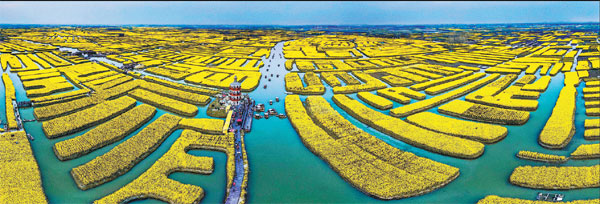Sea of gold floods 'Town of a Thousand Islands'
A patchwork of shimmering rapeseed fields spliced by a network of meandering waterways presents a unique vista in Xinghua. Cang Wei reports from Nanjing.
Flooded by a sea of golden rapeseed flowers, the Qianduo scenic area in Xinghua, Jiangsu province, attracts millions of tourists from around the world every year.
The Qianduo Rapeseed Flower Scenic Area, which covers 4.3 square kilometers, is reputed to be one of the most beautiful spots to see such flowers in the country.
The scenic area, located in Dongwang village of Xinghua, is holding its 10th Rapeseed Flower Festival from late March to early May. With its unique scenery of a sea of golden rapeseed flowers set amid a network of lush green rivers and lakes, it attracted more than 2 million tourists last year.
|
Tourists enjoy the view of golden rape flowers by boat in the Qianduo scenic area in Xinghua, Jiangsu province. Provided to China Daily |
The panorama of rivers and waterways winding through the rapeseed flower fields, or duotian, is unique in China. Duotian, which is the local term for "raised field", are small patches of fertile soil created to have easy access to water for growing crops.
In ancient times, local farmers living near these rivers and lakes dug up the soil up from the riverbeds and piled it high to form farmland where they could grow crops. Each duotian is divided into sections by these waterways, and farmers need to commute by boat to tend to their crops, without the use of agricultural machinery.
A lack of modern machinery and the practice of growing rapeseed crops turned out to be a distinctive ecological travel resource for the city. The thousands of fields at Qianduo differ in size and shape - the largest extend to around 2,000 square meters, while the smallest cover just 2 sq m.
Almost every raised field is surrounded by water. The area is also called the "Town of a Thousand Islands", and poets have been writing about the area's outstanding beauty since ancient times.
These days in Xinghua, tourists can not only meander through the vivid seas of flowers by boat or go fishing, but can also catch a glimpse of the local lifestyle and village culture and even get involved in harvesting farm products.
Thanks to its clean water and fertile environment, the region is also famous for its rice, crab and taro, which have become nationwide favorites since they were introduced in A Bite of China, a popular Chinese television food documentary.
Xinghua's duotian agrosystem was selected as one of the "globally important agricultural heritage systems" by the United Nations Food and Agriculture Organization in April 2004 for its splendid landscapes and agricultural sustainability. "The city's ecological advantage is its precious treasure," says Li Weiguo, Party secretary of Xinghua. "The city and its people have been benefiting from the local ecology, and we will continue to protect the environment for sustainable development."
As a cultural city with a long history, Xinghua has been home to many famous people over the centuries, and earned the reputation as a "city of talent" as early as the Ming Dynasty (1368-1644).
Fan Zhongyan (989-1052), a politician, poet and military thinker, was once the county magistrate in Xinghua.
Shi Naian, the author of Water Margin, was born in Xinghua and returned to his hometown to finish the masterpiece, which is considered one of the most famous novels of ancient China. Shi's tomb, located in Xinduo township, is a cultural relic under the protection of the Jiangsu government.
Many novels from the Ming and Qing (1368-1911) dynasties were written by writers born in Xinghua, making it an important place related to the study of literature from that period.
Xinghua is also the hometown of many famous scholars, including Zheng Banqiao, Liu Xizai and Bi Feiyu. It was named as China's first "Home of Chinese Novels" in April 2012.
Bi, a writer and professor on the faculty of arts at Nanjing University, has been awarded both the Lu Xun and the Mao Dun literature prizes, China's top literature awards.
Several of Bi's works have been adapted into movies, including Blind Massage, a winner at Taiwan's 2014 Golden Horse Awards.
The city government has been making efforts to build a "cultural Xinghua", for which several literature prizes and institutes have been established and activities with literature themes have been held.
There are more than 240 cultural relic and historical sites in Xinghua. Some of the houses of former famous residents have now been protected at a provincial level. By 2014, there were 74 cultural relic units under protection.
Two local customs usually carried out around Tomb Sweeping Day - Maoshan haozi, a style of folk song performed to synchronized movements, with one person leading, and Maoshan boat racing, which is similar to the dragon boat racing held nationwide at Duanwu Festival, though the boats are not decorated as dragons - have also been added to the national list of intangible cultural heritage.
Liu Maomao contributed to this story.
Contact the writer at cangwei@chinadaily.com.cn



















